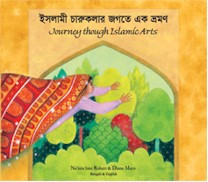BROWSE
Categories



- Home
- By Culture
- Muslim
- Journey Through Islamic Art (Portuguese-English)
Journey Through Islamic Art (Portuguese-English)
Product Description
Author: Na'ima bint Robert
Illustrated by: Diana Mayo
Hardcover: 32 page(s)
Age Range: 6 +
Ontario curriculum: Language - Reading...Social Studies - Heritage and Identity
Book Description:
A young girl's imagination takes flight and carries her on a magical journey. From the great mosques to wondrous palaces and ornamental gardens, she journeys through the rich artistic heritage of the Islamic civilisation. Na'ima's lyrical text and Diana's stunning illustrations bring the richness and beauty of Islamic art to life.
Awards:- WINNER of the UK National Literacy Association WOW! Award 2005
From The Critics:
Children's Book Magazine
This beautifully illustrated introduction to the art of the Islamic world for children... would be a valuable resource in any multicultural classroom... The child narrator in the story weaves herself a magic cloak and takes flight to various parts of the Islamic world, from Moghdol India to Moorish Spain, to view the wide range of styles and art objects that have been created in this culture throughout the centuries. Her magical dream flight takes her to the pavilions in Baghdad, to Samarra, the largest mosque in the world, to the Alhambra palace in Granada, through the bazaars in Turkey and to the Taj Mahal in Agra. On her journey she visits calligraphers, mosaic artists, stonemasons, silversmiths and rug makers - the most notable craftspeople in the Islamic world.
The most attractive feature of this book is the sumptuous illustration style of Diana Mayo who uses colour superlatively to conjure up the flavour of the Islamic world - you might be tempted to touch her illustrations, imagining that you will feel the textures of silk fabric, the joins in a mosaic floor, the coolness of white marble, the softness of a prayer rug or even the desert sand itself. This is a masterpiece of illustration.
This book would be of interest to children at the upper end of the primary school, children studying art at second level and also I feel to adults. It could be used as a basis for looking at and responding to visual art from different cultures and times... or as a basis for looking at different styles of lettering, handwriting and calligraphy around the world."
 Loading... Please wait...
Loading... Please wait... 

